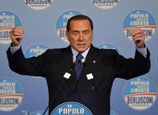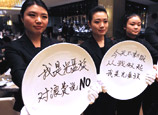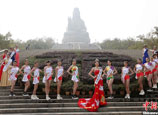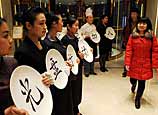
Chinese also questioned the political advisory body for electing a movie star who was not born in Gansu, and worried over her lack of knowledge on the province.
"How can a star surrounded by bodyguards all the time get a chance to be close to common people and understand their life difficulties?" said web user Zhang Ouya.
People like Zhang doubted she could voice local society's needs.
To reassure them, Peng told Xinhua that her attachment to Gansu started in 1999 when she starred in the film "Driving Train to Beijing." The attachment has since strengthened as she visits the province frequently.
"I've visited cities across the province like Lanzhou, Wuwei and Tianshui, and I'm familiar with local culture and customs," she said.
Ma Qixin, president of the Federation of Social Sciences Circle in Qingyang City, also leapt to her defence. "Even locals cannot say they know Gansu from every aspect," according to Ma. "Peng will be a competent stakeholder as she cares about the local society."
Experts said the CPPCC is an occasion for people from all walks of life to speak out freely on the country's politics, so Peng should not be excluded simply because of her background.
"People should focus on what she is doing and what she can do in the future to help advance Gansu's social and economic development," said Zhang Quanren, professor at the Party School with the Gansu Provincial Party Committee.
Peng's fellow advisors and staff at the conference said she has been performing her role very seriously.
"She has been making constructive suggestions during the session. She is competent because she is wholeheartedly concerned with the place," said Ma Qixin.
Peng proposes to establish a film operation base in Gansu to create more job opportunities and help drive the local economy.
The election as political officers of other movie stars, such as Hong Kong comedy actor Stephen Chow and pianist Li Yundi, similarly drew people's suspicions.
"It is a new media era in which communication and information sharing are utterly convenient. People are more outspoken now about their own interests, which is why they have increasing doubts about the competence of stars-turned-advisors," said an academic from the Gansu Provincial Academy of Social Sciences wishing to be referred to as professor Bao.
Some experts and netizens believe imperfect selection procedures have allowed the public to doubt delegates' abilities to live up their commitment to the people.
"People will trust the delegates more if the procedure becomes more transparent," according to Xiao Bin, professor at Sun Yat-sen University's School of Government.
 |
















 Photo story: The art of food, the art of life
Photo story: The art of food, the art of life


![]()
